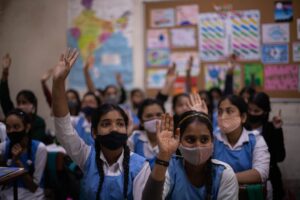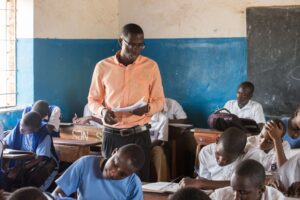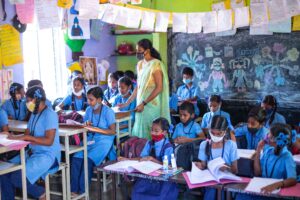Covid-19 has caused the greatest shock to education systems in living memory. It has affected the education of more than 90% of the world’s children, with many losing up to 18 months of learning time. Now that schools have reopened their doors, governments have been able to assess the impact of these closures and developed plans to address this next period of learning recovery.
India and Uganda both had some of the longest school lockdowns in the world, and we’re proud to be working alongside state and national governments as they grapple with the present challenges. In this article, we share how our work in three geographies is tailored to have an impact on these issues, and what we have learnt since schools reopened.
Headlines
- We have found that governments have needed to reshape and redesign strategies and policies to respond to the challenges of the COVID recovery period. As part of our learning partnerships with governments, we have been able to offer support as strategic thought partners as well as in the implementation of new initiatives and approaches. This has led to stronger partnerships with governments, for example, in Karnataka, we have recently signed a new Memorandum of Understanding with the State government, one of only three NGOs working with the State to support their learning loss recovery programme.
- Our work in each geography post-COVID has built on the work we delivered in partnership with governments during the pandemic, particularly around the themes of the social and emotional well-being of teachers and students and bridging learning loss. We have also been able to help and influence governments to make connections between these priorities and focus on a holistic approach to learning.
- In geographies where we were able to make hybrid models of delivery (online/ in-person) work well during the lockdowns, we have been able to continue this mode of delivery, which as we move forward with new MOUs in both Karnataka and Tamil Nadu, is providing opportunities for greater scale.
Delhi
One of the main priorities of the Delhi government during this period, as it had been during the school closures, was to promote the social and emotional well-being of students. When schools reopened, students were welcomed with decorations, celebrations and songs, signalling that schools were safe places happy to welcome them back.
The other main priority was to improve students’ foundational literacy and numeracy levels, under the headline of the state’s Mission Buniyaad programme. After discussion with state officials, we agreed to develop training content for teachers and school leaders to connect the two priorities. We shared strategies that teachers could use to support the well-being of students participating in Mission Buniyaad, in order to enhance its effectiveness.

Our two core strategies focused on normalising mistakes and developing a culture of appreciation. Both strategies intend to help students feel safe and confident in their ability to learn. We have also shared best practices and challenges arising from the implementation of Mission Buniyaad, so that all teachers can learn and improve.
One teacher shared the following feedback: “As I was running a weekly assessment with one of my students, I sensed that they were very nervous. I told them to take a break and come back the next day. I also reminded them that this was a low-stakes assessment and encouraged them to relax. When he returned, he performed much better.”
Uganda
In Uganda, there has been a significant concern that many children may never return to school. The initial priority was therefore to support national back-to-school initiatives and build momentum for both teachers and learners. We shared strategies that built connections with learners, such as greeting at the door and calling children by name. We also encouraged the use of social and emotional learning strategies to build routines in classrooms. Teachers reported that the creation of an emotional coping guide, the introduction of gratitude circles and the resumption of regular reflection meetings all helped to increase their resilience to cope with the changing environment.

Another important area has been addressing teacher and learner motivation. After the loss of so much learning time, we needed to rebuild confidence in their capacity to learn by developing a growth mindset. We supported district officials to deliver a tailored coaching programme, so that school leaders can educate themselves, their teachers and their students about what it means to have a growth mindset. We have also started to share videos to help to reinforce good practice. Teachers now praise students for their effort and potential rather than only their abilities. Students are encouraged to learn from their mistakes and see them as a critical part of learning.
One of the challenges faced when schools reopened was a significant increase in underage pregnancies in girls as young as 11 years old. Teachers often had their own biases towards these girls and would often address the situation harshly. The result was that many girls did not return to school. We have worked with the Ministry of Education and Sports to integrate gender responsiveness training in our programme and this has already started to shift attitudes and behaviours, as can be seen in the case study of Olive Nambi, a High School Principal.
Karnataka
The state of Karnataka is so focused on the issue of learning loss that they have declared the new school year to be the ‘Kalika Chetarike’ (or ‘Learning Recovery’ year). Their priority is to ensure that all school children catch up on lost learning, rather than completing the current grade-level syllabus. This approach focuses on foundational literacy and numeracy skills, while also considering the competencies and skills that students must have mastered in the past two interrupted years. Learning outcomes for each grade have been restructured to accommodate this.

We’ve recently signed a new memorandum of understanding to expand our programme to every district in the state. We’ll be focusing our content on three key thematic areas:
- Establishing an effective learning environment for Kalika Chetarike by embedding the principles of active learning. Teacher instruction will focus on activating prior knowledge, giving effective instructions, ensuring good pacing and providing time to recap and revisit learning.
- Building confidence in delivering formative assessments for Kalika Chetarike. In order to understand the impact of the programme, teachers will need to be able to deliver effective diagnostic assessments and continuous formative assessments to adjust classroom instruction to address students’ learning.
- Promoting social and emotional well-being. A survey found that almost 70% of teachers believed that some or most children would need attention with respect to socio-emotional issues. We know that teachers play an important role in creating emotionally safe and engaging learning environments, so we will share strategies that help them to plan and implement activities that support the well-being of students.
Our learning so far
- In a recent article, the World Bank, UNICEF and UNESCO have stated that there will be no recovery without empowered, motivated and effective teachers. We couldn’t agree more. Our work in this period has highlighted the importance of providing teachers with opportunities to build autonomy, mastery and purpose, in order for them to re-energise and be motivated in the classroom after such long school closures.
- In our 2025 strategy, we are clear that we need to be responsive and flexible to government needs and priorities and contextualise the programme accordingly. The COVID recovery period and the subsequent flux in government priorities have highlighted to us even more how we will need to be flexible in our programme design and delivery, whilst staying true to our core purpose and principles.
- We are increasingly confident that the core components of our programme can be adapted to meet the needs of changing times and changing priorities.
- And we have seen how equipping teachers with fairly simple strategies and tools (such as normalising mistakes in the classroom or gratitude circles) can really lead to change in the classroom.
- But, we also know that this is the beginning of the journey and that fully responding to the impact of sustained school closures will take significant time and effort. We are committed to working with our government and other partners to ensure our programme supports this response.

